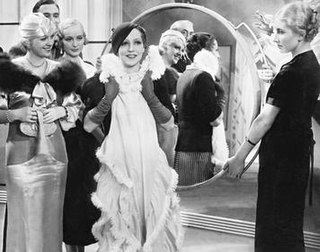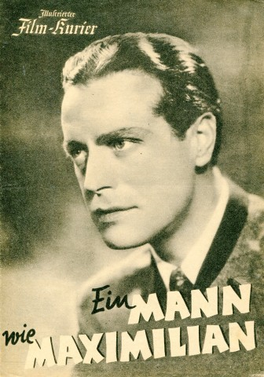
Just Once a Great Lady is a 1934 German comedy film directed by Gerhard Lamprecht and starring Käthe von Nagy, Wolf Albach-Retty and Gretl Theimer. Nagy plays a car saleswoman. The film's sets were designed by the art directors Otto Erdmann and Hans Sohnle. A separate French-language version A Day Will Come (1934) was also released, with Nagy reprising her role alongside Jean-Pierre Aumont.

Two Hearts Beat as One is a 1932 German musical film directed by Wilhelm Thiele and starring Lilian Harvey, Wolf Albach-Retty and Kurt Lilien. It was shot at the Babelsberg Studios in Berlin. The film's sets were designed by the art directors Werner Schlichting and Benno von Arent. A separate French-language version The Girl and the Boy was made, also starring Harvey.

Spring Parade is a 1934 comedy film directed by Géza von Bolváry and starring Paul Hörbiger, Franciska Gaal, and Wolf Albach-Retty.

The Mine Foreman is a 1952 Austrian historical musical film directed by Franz Antel and starring Hans Holt, Josefin Kipper and Wolf Albach-Retty. The film is an operetta film, which is based on the libretto of the 1894 operetta of the same title by Ludwig Held and Moritz West. It is set in the reign of Ludwig I of Bavaria. The film's sets were designed by Isabella and Werner Schlichting.

Dangerous Guests is a 1949 West German comedy film directed by Géza von Cziffra and starring Wolf Albach-Retty, Vera Molnar and Paul Kemp. It was made at the Wandsbek Studios of the Hamburg-based Real Film. The film's sets were designed by the art director Mathias Matthies. It was remade by von Cziffra in 1960 as the Austrian film Crime Tango.

The Bird Seller is a 1953 West German musical film directed by Arthur Maria Rabenalt and starring Ilse Werner, Wolf Albach-Retty and Eva Probst.

The Bird Seller is a 1935 German musical comedy film directed by E. W. Emo and starring Maria Andergast, Wolf Albach-Retty, and Lil Dagover. It is an operetta film, based on the work of the same name by Carl Zeller.

A Man Like Maximilian is a 1945 German comedy film directed by Hans Deppe and starring Wolf Albach-Retty, Karin Hardt and Lizzi Waldmüller. It was one of the last films released during the Third Reich and was playing in cinemas during the Battle of Berlin.

The Seven Dresses of Katrin is a 1954 West German romantic comedy film directed by Hans Deppe and starring Sonja Ziemann, Paul Klinger, and Georg Thomalla.

School for Marriage is a 1954 West German comedy film directed by Rainer Geis and Anton Schelkopf and starring Wolf Albach-Retty, Cornell Borchers, and Liselotte Pulver. It was shot at the Bavaria Studios in Munich and on location in the Alps and in Paris. The film's sets were designed by the art director Ludwig Reiber.

The Post Has Gone is a 1962 West German musical comedy film directed by Helmuth M. Backhaus and starring Vivi Bach, Adrian Hoven, and Claus Biederstaedt.

Girl with a Future is a 1954 West German comedy drama film directed by Thomas Engel and starring Herta Staal, Peter Pasetti and Nadja Tiller. It was shot at the Tempelhof Studios in West Berlin.The film's sets were designed by the art directors Emil Hasler and Walter Kutz.

Love Must Be Understood is a 1933 German musical comedy film directed by Hans Steinhoff and starring Rosy Barsony, Georg Alexander, and Wolf Albach-Retty. It was shot at the Babelsberg Studios in Berlin. The film's sets were designed by the art director Benno von Arent.

Hunting Party or Hubertus Hunt is a 1959 West German drama film directed by Hermann Kugelstadt and starring Wolf Albach-Retty, Willy Fritsch and Lucie Englisch. It is part of the tradition of heimatfilm which were at their commercial peak during the decade. Its German title is a reference to the traditional Hubertus Day hunts commemorating the life of St. Hubert of Liege.

Seven Years of Good Luck is a 1942 German comedy film directed by Ernst Marischka and starring Wolf Albach-Retty, Theo Lingen and Hans Moser. It is a sequel to the 1940 film Seven Years Hard Luck.
Seven Years of Happiness is a 1943 Italian "white-telephones" comedy film directed by Ernst Marischka and Roberto Savarese and starring Vivi Gioi, Wolf Albach-Retty and Hans Moser.

Hotel Sacher is a 1939 German drama film directed by Erich Engel and starring Sybille Schmitz, Willy Birgel, and Wolf Albach-Retty.

Tales from the Vienna Woods is a 1934 Austrian musical film directed by Georg Jacoby and starring Magda Schneider, Wolf Albach-Retty and Leo Slezak. The title refers to the waltz Tales from the Vienna Woods by Johann Strauss.

My Children and I is a 1955 West German comedy drama film directed by Wolfgang Schleif and starring Grethe Weiser, Doris Kirchner and Claus Biederstaedt. It was shot at the Templehof Studios in West Berlin. The film's sets were designed by the art directors Mathias Matthies and Ellen Schmidt.

And Who Is Kissing Me? is a 1956 Austrian comedy film directed by Max Nosseck and starring Hans Moser, Grethe Weiser, Theo Lingen and Johannes Heesters, who each play themselves. The film's sets were designed by the art director Felix Smetana. Location shooting took place in Vienna. It is not a remake of the 1933 German film And Who Is Kissing Me?. The film is also known by the alternative title Ein Herz und eine Seele.



















